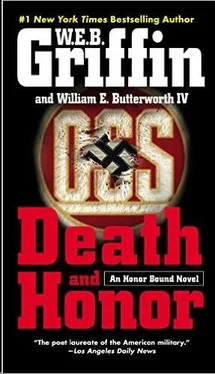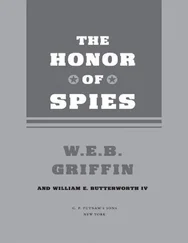Griffin W.E.B. - Honor Bound 04 - Death and Honor
Здесь есть возможность читать онлайн «Griffin W.E.B. - Honor Bound 04 - Death and Honor» весь текст электронной книги совершенно бесплатно (целиком полную версию без сокращений). В некоторых случаях можно слушать аудио, скачать через торрент в формате fb2 и присутствует краткое содержание. Год выпуска: 2009, Издательство: Penguin USA, Inc., Жанр: Старинная литература, на английском языке. Описание произведения, (предисловие) а так же отзывы посетителей доступны на портале библиотеки ЛибКат.
- Название:Honor Bound 04 - Death and Honor
- Автор:
- Издательство:Penguin USA, Inc.
- Жанр:
- Год:2009
- ISBN:нет данных
- Рейтинг книги:4 / 5. Голосов: 1
-
Избранное:Добавить в избранное
- Отзывы:
-
Ваша оценка:
- 80
- 1
- 2
- 3
- 4
- 5
Honor Bound 04 - Death and Honor: краткое содержание, описание и аннотация
Предлагаем к чтению аннотацию, описание, краткое содержание или предисловие (зависит от того, что написал сам автор книги «Honor Bound 04 - Death and Honor»). Если вы не нашли необходимую информацию о книге — напишите в комментариях, мы постараемся отыскать её.
Honor Bound 04 - Death and Honor — читать онлайн бесплатно полную книгу (весь текст) целиком
Ниже представлен текст книги, разбитый по страницам. Система сохранения места последней прочитанной страницы, позволяет с удобством читать онлайн бесплатно книгу «Honor Bound 04 - Death and Honor», без необходимости каждый раз заново искать на чём Вы остановились. Поставьте закладку, и сможете в любой момент перейти на страницу, на которой закончили чтение.
Интервал:
Закладка:
“The traitor in the embassy has not yet been detected,” Bormann said. “Until he has been, everyone is therefore under suspicion.”
“Even so, while I am reluctant to question SS-Brigadeführer von Deitzberg, I’m not at all sure that Boltitz is a wise choice.”
“Why not?”
“For one thing, Boltitz has no experience—absolutely none at all—in these areas—”
“And, for another, you’d like him back here in Berlin?” Bormann interrupted.
“Frankly, yes, I would. I would like him doing work for which he is qualified. And he’s not qualified for this.”
“He has two very important qualifications for this. He enjoys the full confidence of SS-Brigadeführer von Deitzberg and Vizeadmiral Canaris.”
“He does not have my full confidence to perform in a role like this,” Canaris said.
“The decision has been made, Canaris. Frankly, von Deitzberg said that he thought you would be unhappy with it. I understand. But we must think of what is best for Operation Phoenix, Operation Perón, and the Führer.”
“Those are also my priorities, Herr Reichsleiter. I can propose to you the names of half a dozen—”
He stopped when Bormann held up both hands, palms outward.
“Perhaps you didn’t understand me when I said the decision has been made, Herr Vizeadmiral,” Bormann said with a cold smile.
Canaris didn’t reply.
“Korvettenkapitän Boltitz will be assigned to the embassy as naval attaché,” Bormann went on, “where he will be in a position to keep an eye not only on Gradny-Sawz but on the ambassador and von Wachtstein as well. He will—von Deitzberg will set up the details of how before he returns—report directly to me. I will, of course, furnish you with the pertinent details of his reports.”
Canaris nodded his understanding.
"A word of advice, Canaris, in case you were thinking of appealing this decision. ”
“I know full well how much faith the Führer has in you, Herr Reichsleiter. And I try hard to avoid fighting battles I know I cannot win.”
“Don’t think of it as a battle, Canaris. But rather as an accommodation— even a sacrifice—on your part for the common good.”
Canaris nodded.
“And now, Herr Reichsleiter, may I plead the press of duties and ask to be excused?”
“I understand,” Bormann said.
“Thank you for a splendid luncheon,” Canaris said.
“It’s always a pleasure to see you, Canaris.”
Canaris laid his napkin on the table, came to attention, thrust his right arm out, and barked, “Heil Hitler!”
Bormann returned the salute with an almost casual wave of his arm.
Canaris’s car, an Opel Kapitän, was the least pretentious on the row of official cars lined up outside the Reich Chancellery. All the others were either a Mercedes-Benz or a Maybach; there even was an American Packard. The vizeadmiral walked to his Opel and got in before the SS trooper in charge of what was the parking lot for very senior officers could have it waved to meet him at the steps.
Canaris thought about the exchange with Bormann all the way to his office. It had gone well, far better than he had hoped it would, and thinking that raised caution flags.
When things are obviously going very well, they almost surely are not.
He opened the door for himself when he got to his office building, and returned the salutes of the navy petty officers on guard with a military—not the Nazi—salute.
He went into his office and told his secretary to get him a cup of coffee, then leave him undisturbed.
He waited until the coffee—black, and in a heavy navy-issue china mug— was delivered. Then he got from behind his desk and went to his private toilet.
After a moment, without having used the facility, he flushed the toilet and turned the water on in the sink.
And then, very softly, almost in a whisper, he said, “I will be goddamned. The swine not only let my fox into his chicken coop, but practically pushed him in.”
[TWO]
Office of the Director Office of Strategic Services National Institutes of Health Building Washington, D.C. 0930 29 June 1943
Every once in a great while, there is not much going on that requires me to make an immediate major decision, Brigadier General William J. Donovan, the director of the United States Office of Strategic Services, mused, so it therefore logically follows that when that happens—as now—I am presented with idiotic suggestions, off-the-wall analysis, and problems I really don’t want to—shouldn’t have to—deal with.
There were several such suggestions, analyses, and problems on the desk of the stocky, well-tailored, sixty-year-old Wall Street lawyer who had been chosen by his Columbia Law School classmate and close personal friend, President Franklin Delano Roosevelt, to coordinate the flow of “war information.” That meant both intelligence and propaganda.
Donovan had learned—or maybe brought with him from the practice of law—that idiot suggestions, on closer examination, sometimes proved really not to be so idiotic after all. And that off-wall-analysis sometimes contained information that was quite useful. And that problems he was reluctant to deal with were really the ones that deserved his full attention.
Reminding himself of this, he unwound the string holding together an accordion folder. He peered inside, then dumped the contents onto his desk.
He shook his head in disbelief. A thirty-second glance at what was being proposed showed him that this really was an idiotic suggestion: Someone wanted to give OSS agents badges and credentials, as if they were policemen, or agents of the Bureau of Internal Revenue.
Sample credentials had been prepared. Donovan picked up one of them, examined it carefully, and shook his head again.
The original organization—the Office of the Coordinator of Information— had given William J. Donovan the responsibility for coordinating both propaganda and intelligence generated by all the agencies of the federal government. It was created on 11 July 1941 by Executive Order of the President.
It had immediately become apparent that that idea wasn’t going to work.
For one thing, Donovan knew little—and admitted it—about influencing public opinion. More important, the Army’s and Navy’s intelligence organizations didn’t like the idea of anyone else coordinating, reviewing or having anything else to do with their intelligence data. Even more important, neither did J. Edgar Hoover, the powerful director of the Federal Bureau of Investigation, who had quickly made it clear that he wasn’t going to willingly share FBI files with anyone.
Shortly after war came to the United States, on 7 December 1941, the Joint Chiefs of Staff, which was to control all the armed forces, was formed. Donovan, believing that there was a place in the military organization of the United States for a covert intelligence-gathering and sabotage organization serving all the armed forces, struck a deal with the new Joint Chiefs under which the COI—less the propaganda function, which would become the Office of War Information—would be placed under the Joint Chiefs.
The Joint Chiefs—underestimating “Wild Bill” Donovan—believed this would give them control of the intelligence-gathering and sabotage operations of what would be known as the Office of Strategic Services. President Roosevelt issued another Executive Order on 13 June 1942, establishing the OSS and naming Donovan, still a civilian, as director. Very importantly, the OSS would have access to the President’s virtually unlimited “unvouchered funds” provided by Congress to be spent as the President wished, and not subject to public scrutiny. The JCS thought this was a fine idea, too, as it would relieve them of the responsibility of paying for Donovan’s operations, which they considered useful and important mainly because the President said they would be.
Читать дальшеИнтервал:
Закладка:
Похожие книги на «Honor Bound 04 - Death and Honor»
Представляем Вашему вниманию похожие книги на «Honor Bound 04 - Death and Honor» списком для выбора. Мы отобрали схожую по названию и смыслу литературу в надежде предоставить читателям больше вариантов отыскать новые, интересные, ещё непрочитанные произведения.
Обсуждение, отзывы о книге «Honor Bound 04 - Death and Honor» и просто собственные мнения читателей. Оставьте ваши комментарии, напишите, что Вы думаете о произведении, его смысле или главных героях. Укажите что конкретно понравилось, а что нет, и почему Вы так считаете.












